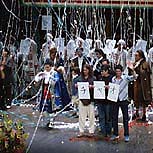REVIEWS
I Puritani and Il Barbiere di Siviglia,
Teatro Comunale di Bologna Japan Tour June 2002
A bel canto banquet in two courses served in Japan, Classics Today
Juan Diego se fue lleno de flores, IPC Japan
________________________________________________
A bel canto banquet in two courses served in Japan
Carlo Vitali, Classics Today, June 2002
Bunka Kaikan Auditorium, Tokyo, Japan; June 4 & 6, 2002
Tokyo opera lovers -- who are willing to pay up to ¥ 59,900 ($500.00)
for a single performance, including seat, program and libretto
translation -- certainly deserve the best. At Bunka Kaikan Auditorium,
seating 2,300 and boasting almost perfect acoustics, they were treated
to a regular bel canto banquet of Bellini's I Puritani and Rossini's Il
barbiere di Siviglia thanks to the combined efforts of the Teatro
Comunale di Bologna and Fuji Television, and they apparently enjoyed it
a lot. Western visitors watching scenes of wild enthusiasm only
surpassed by historical descriptions of 19th-century Italian theaters,
when militia storming the house to rebuke rioters were frequent
occurrences, may wonder who invented the myth of Japanese impassibility.
Or is it a sort of collective therapy through forcibly expressed
emotions? Maybe, although it's certain that opera-goers are as competent
here as anywhere else. They clap, keep silent, laugh, etc. at the right
places, with some help from the (vertical) titles running on both sides
of the stage.
That said, one should feel able to treat an Italian opera show in Tokyo
as a perfectly normal event in a globalized world, at least as much as
Kabuki on Broadway or Kathakali dance in Venice, although culture-bound
factors may sometimes play a role. For exemple, in Puritani, particular
enthusiam was raised when Giorgio (Ildebrando D'Arcangelo) and Riccardo
(Leo Nucci) sang their Act II cabaletta duet, "Suoni la tromba," when
they were taking an oath on their crossed swords, and such
self-explanatory comments as 'samurai' were heard among the loud
applause. Earlier in Act I, Nucci had consolidated his long-standing
position as a favorite of the local public with a stunning "Ah! per
sempre io ti perdei" stuffed with heart-rending mezza voce and elaborate
melismatic passages. Next in popularity and excellence came Edita
Gruberova as Elvira, a never-ending surprise with her supremely elegant
vocal production and impeccable coloratura. Although a bit lacking in
volume and experiencing occasional hardships in her highest register
during Act I, she gradually warmed up and came to a complete recovery,
thus delivering a grand mad scene and a fully vibrant finale. Also
praiseworthy was Giuseppe Sabbatini's Arturo, a reliable Cavalier in his
refined acting and polished head voice, notwithstanding a certain
extreme slowness in approaching his "A te, o cara" - which, however, may
partly be ascribed to conductor Friedrich Haider's generally too
comfortable pacing. Pier'Alli's stage design, both functional and
colorful, imposed a plainly realistic allure to the direction. Being
understandably ill-at-ease with English history and the Glorious
Revolution, the Japanese would hardly appreciate the usual time-machine
gimmicks of Western Konzeptregie or director's opera.
This applied also to Giovanni Agostinucci's production of Il
barbiere..., which actually looked like Seville in the full glory of a
Mediterranean starry night as the curtain rose on Almaviva and his
shabby band of serenaders. Juan Diego Florez as Almaviva was a miracle
of accuracy and grace throughout (although a bit nasal at times);
Vesselina Kasarova's Rosina coupled terrific acting with powerful chest
notes and faultless precision, fearlessly approaching and conquering
gigantic leaps and coloratura passages. Clearly, she has learned much
both from her long-time friend Gruberova and from Horne, yet she is an
original talent and imitates nobody. The Dons, Bruno Praticò as Bartolo
and Giovanni Furlanetto as Basilio, well matched each other in their
mighty buffo bass voices as much as in their appearances: a green and a
black beetle, respectively, wearing elaborated Goya-like wigs. Further
delight was provided in minor roles: Fiorello (Roberto Accurso), Berta
(Patrizia Biccirè), The Officer (Marco Danieli). They all reaped
impressive "bravis!" in original Italian, for the Tokyo opera-goers
happily also know the difference between "bravo," "brava" and "bravi."
But the loudest "bravo" -- a most deserved one -- went to conductor
Daniele Gatti. Calm, collected and ever-present, he led the woundrous
Rossini clockwork to a triumphant ending, then bowed like a trueborn
Japanese for a quarter-hour and more of frantic curtain calls.
Juan Diego se fue lleno de flores
Pablo Lores Kanto, IPC Japan, 22 June 2002
"El Barbero de Sevilla", con el tenor peruano Juan Diego Flórez como uno
de sus principales protagonistas, se despidió de Japón con una
apoteósica última función. El peruano, quien hace con su voz lo que
Ronaldo con la pelota, se metió al público en el bolsillo en el epílogo
de la obra con una interpretación que le costó varios minutos de ovación
y el desborde de algunas lágrimas de emoción.

Aquellos sostenidos aplausos y "bravos" y otros elogios gritados a todo
pulmón por un público que hace más de cien años goza de la llamada
música culta y aprecia la cultura occidental como si fuera propia,
premiaron la calidad de un artista como Flórez, quien llegó precedido de
una merecida fama, entre ellas, el ser considerado como el más probable
sucesor del gran Luciano Pavarotti o de cualquiera de los otros dos
tenores, Domingo o Carrera.
Nacido en Lima hace 29 años, Flórez deleitó representando el papel del
conde Almaviva, quien con el apoyo de Fígaro, (el barítono Leo Nucci)
enamora a la bella Rosina, encarnada por la mezzasoprano Vaselina
Kasarova.
This page was last updated on: September 26, 2002